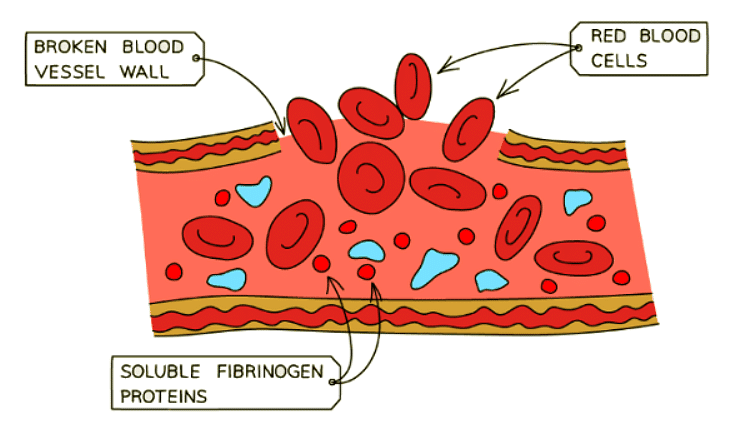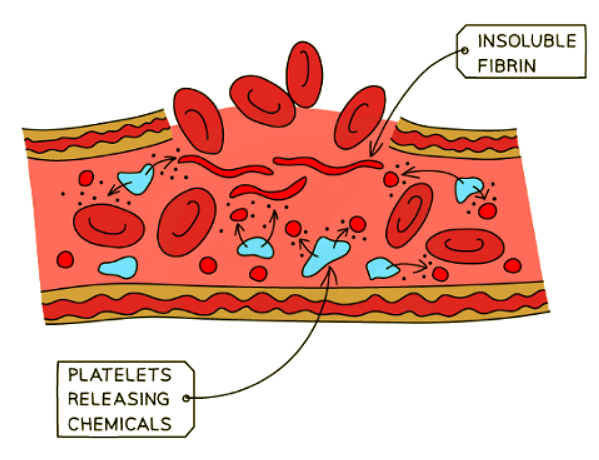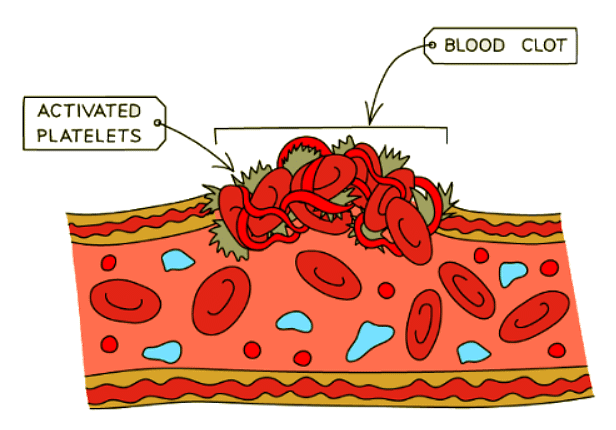Class 10 Exam > Class 10 Notes > Biology for GCSE/IGCSE > Conversion of Fibrinogen
Conversion of Fibrinogen | Biology for GCSE/IGCSE - Class 10 PDF Download
Conversion of Fibrinogen: Extended
- Platelets: Platelets are cell fragments that play a crucial role in blood clotting and scab formation when the skin is cut or punctured.
- Preventing Blood Loss: Blood clotting is essential to prevent ongoing or significant blood loss from wounds.
- Scab Formation: The formation of a scab creates an insoluble barrier that seals the wound, preventing the entry of microorganisms that could cause infections.
- Healing Process: The scab stays in place until new skin has regenerated underneath, effectively resealing the skin.
How the blood clots


 Process of Blood Clotting
Process of Blood Clotting
- When there is a wound, platelets rush to the site to stop bleeding.
- A sequence of reactions takes place within the blood plasma.
- Platelets release chemicals that transform soluble fibrinogen proteins into insoluble fibrin, creating a mesh that traps red blood cells, forming a clot.
- Over time, the clot dries out and forms a scab, protecting the wound from bacterial invasion.
Key Concepts
- Soluble Fibrinogen Proteins: These proteins are converted into insoluble fibrin during the clotting process.
- Insoluble Fibrin: Forms a mesh that helps in clot formation.
- Insoluble Mesh: The network formed by fibrin, trapping blood cells to form a clot.
- Scab Formation: The dried clot that shields the wound from infections.
Question for Conversion of FibrinogenTry yourself: What is the role of platelets in the blood clotting process?View Solution
The document Conversion of Fibrinogen | Biology for GCSE/IGCSE - Class 10 is a part of the Class 10 Course Biology for GCSE/IGCSE.
All you need of Class 10 at this link: Class 10
|
101 videos|193 docs|33 tests
|
FAQs on Conversion of Fibrinogen - Biology for GCSE/IGCSE - Class 10
| 1. How does fibrinogen play a role in blood clotting? |  |
Ans. Fibrinogen is a protein in the blood that plays a crucial role in the clotting process. When there is an injury or damage to a blood vessel, fibrinogen is converted into fibrin strands, which help form a clot to stop bleeding.
| 2. What factors influence the conversion of fibrinogen into fibrin? |  |
Ans. The conversion of fibrinogen into fibrin is influenced by various factors, including the presence of calcium ions, enzymes such as thrombin, and the activation of platelets.
| 3. Why is the conversion of fibrinogen important for wound healing? |  |
Ans. The conversion of fibrinogen into fibrin is essential for wound healing as it helps to form a stable blood clot at the site of injury, preventing excessive bleeding and providing a scaffold for tissue repair.
| 4. Can abnormalities in the conversion of fibrinogen lead to health problems? |  |
Ans. Yes, abnormalities in the conversion of fibrinogen can lead to various health problems, such as excessive bleeding disorders or clotting disorders, which can increase the risk of heart attacks or strokes.
| 5. How is the conversion of fibrinogen regulated in the body? |  |
Ans. The conversion of fibrinogen is tightly regulated by a balance of pro-coagulant and anti-coagulant factors in the blood to ensure that blood clots form appropriately in response to injury but do not lead to abnormal clotting elsewhere in the body.
Related Searches















